Related Research Articles

Edward William O'Sullivan was an Australian journalist and politician.
The third Cowper ministry was the seventh ministry of the Colony of New South Wales, and third occasion of being led by Charles Cowper.
Charles Edward Pilcher was an Australian barrister and member of the Parliament of New South Wales.
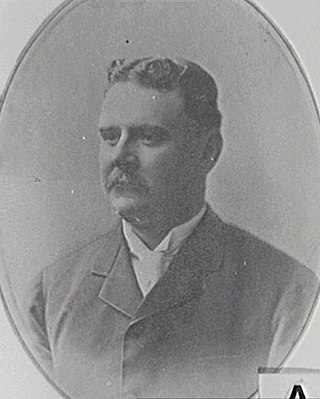
Sir William Patrick Manning was an Australian financier and politician.
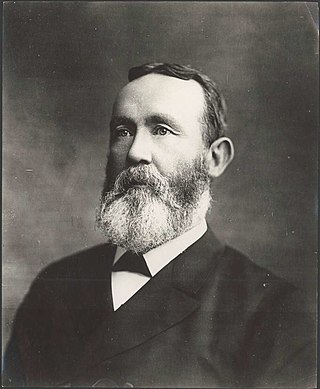
Francis Augustus Wright was a merchant sailor, gold miner, carrier and member of the Parliament of New South Wales.
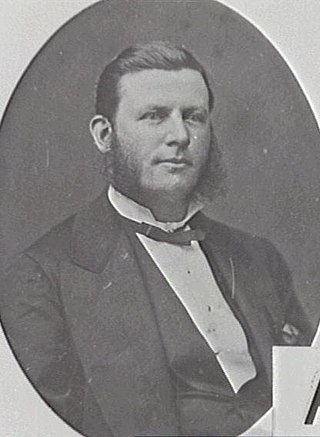
John Davies , was a member of the Parliament of New South Wales.
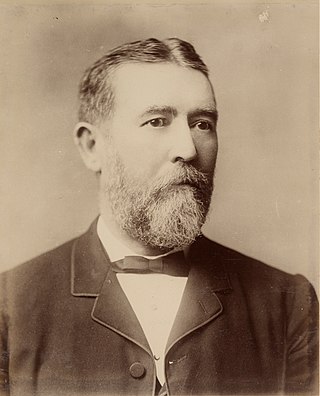
James Watson was an Australian politician, Colonial Treasurer of New South Wales 1878 to 1883.

Jacob Garrard was a politician in colonial New South Wales, serving as Secretary for Public Works and Minister of Public Instruction.

The 1891 New South Wales colonial election was held in the then colony of New South Wales between 17 June to 3 July 1891. This election was for all of the 141 seats in the New South Wales Legislative Assembly and it was conducted in 35 single-member constituencies, 20 2-member constituencies, 10 3-member constituencies and nine 4-member constituencies, all with a first past the post system. Part 1 of the Electoral Act of 1880 set the qualification for election on "every male subject of Her Majesty of the full age of twenty-one years and absolutely free being a natural born or naturalized subject". Seven seats were uncontested. The previous parliament of New South Wales was dissolved on 6 June 1891 by the Governor, The Earl of Jersey, on the advice of the Premier, Sir Henry Parkes.

John McElhone was an Australian politician.
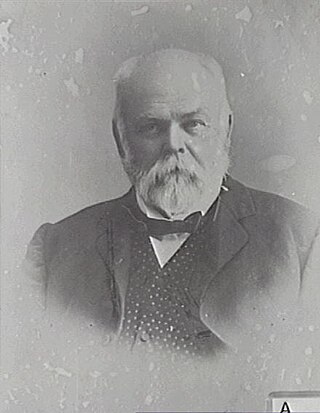
Sydney Burdekin was an Australian politician.

Hugh Taylor was an Australian politician.

Alban Joseph Riley was an Australian politician. He was mayor of the City of Sydney and a Member of the New South Wales Legislative Assembly.

Septimus Alfred Stephen, generally referred to as S. A. Stephen, was an Australian politician, solicitor and founding member of the law firm Stephen, Jaques and Stephen.

James Merriman was an Australian cooper, whaler, publican, shipowner, alderman, mayor of Sydney and member of the New South Wales Parliament.
A by-election was held for the New South Wales Legislative Assembly electorate of Parramatta on 10 April 1861 caused by the resignation of sitting member James Byrnes. At the election in December 1860 he gained second place behind a newcomer John Lackey. While still successful, Byrnes took offence at being placed second, stating that the majority of voters had decided that he was not fit to serve them and resigned in March 1861 without taking his seat.
A by-election was held for the New South Wales Legislative Assembly electorate of Mudgee on 6 March 1883 because of the resignation of Adolphus Taylor after a heated argument with the member for Upper Hunter John McElhone in which McElhone challenged Taylor to resign and both would contest Taylor's seat.
The 1883 Upper Hunter colonial by-election was held on 6 March 1883 for the New South Wales Legislative Assembly electorate of Upper Hunter because of the resignation of John McElhone after a heated argument with the member for Mudgee Adolphus Taylor in which McElhone challenged Taylor to resign and both would contest Taylor's seat. The Newcastle Morning Herald and Miners' Advocate reported that despite McElhone saying he would not stand for Upper Hunter, he had been nominated without his authority.
A by-election was held for the New South Wales Legislative Assembly electorate of Gundagai on 21 November 1884 because of the resignation of Bruce Smith, to return to Melbourne to run his father's business, WM Howard Smith and Sons Ltd.
A by-election was held for the New South Wales Legislative Assembly electorate of University of Sydney on 15 July 1879 because William Windeyer resigned to accept a temporary appointment as a judge of the Supreme Court.
References
- 1 2 "Mr Alfred Lamb (1845-1890)". Former members of the Parliament of New South Wales . Retrieved 13 May 2019.
- ↑ "Writ of election: West Sydney". New South Wales Government Gazette . No. 586. 16 October 1890. p. 8015. Retrieved 6 November 2020– via Trove.
- ↑ "Mr Adolphus George Taylor (1857-1900)". Former members of the Parliament of New South Wales . Retrieved 1 May 2019.
- ↑ Rutledge, Martha. "Taylor, Adolphus George (1857-1900)". Australian Dictionary of Biography . Canberra: National Centre of Biography, Australian National University. ISBN 978-0-522-84459-7. ISSN 1833-7538. OCLC 70677943 . Retrieved 28 April 2021.
- ↑ "John Taylor". Sydney's Aldermen. City of Sydney. Retrieved 6 November 2020.
- ↑ Green, Antony. "1880 Balmain". New South Wales Election Results 1856-2007. Parliament of New South Wales . Retrieved 23 April 2020.
- ↑ Green, Antony. "1882 Balmain". New South Wales Election Results 1856-2007. Parliament of New South Wales . Retrieved 21 April 2020.
- 1 2 Green, Antony. "1890 West Sydney by-election". New South Wales Election Results 1856-2007. Parliament of New South Wales . Retrieved 6 November 2020.
- ↑ "The West Sydney election". The Daily Telegraph . 21 October 1890. p. 4. Retrieved 6 November 2020– via Trove.
- ↑ Nairn, Bede (1969). "Brennan, Peter Joseph (1843–1906)". Australian Dictionary of Biography . Canberra: National Centre of Biography, Australian National University. ISBN 978-0-522-84459-7. ISSN 1833-7538. OCLC 70677943 . Retrieved 6 November 2020.